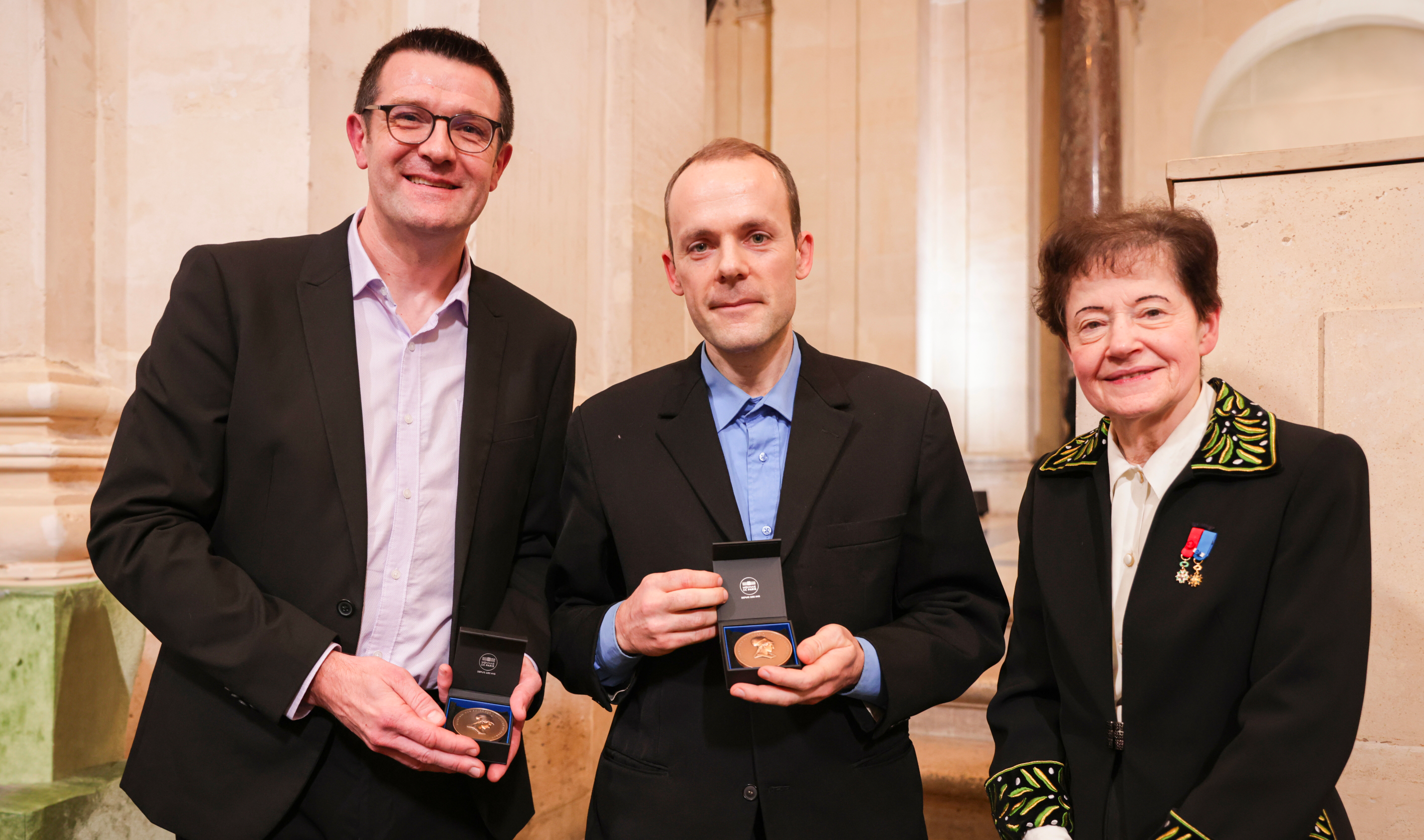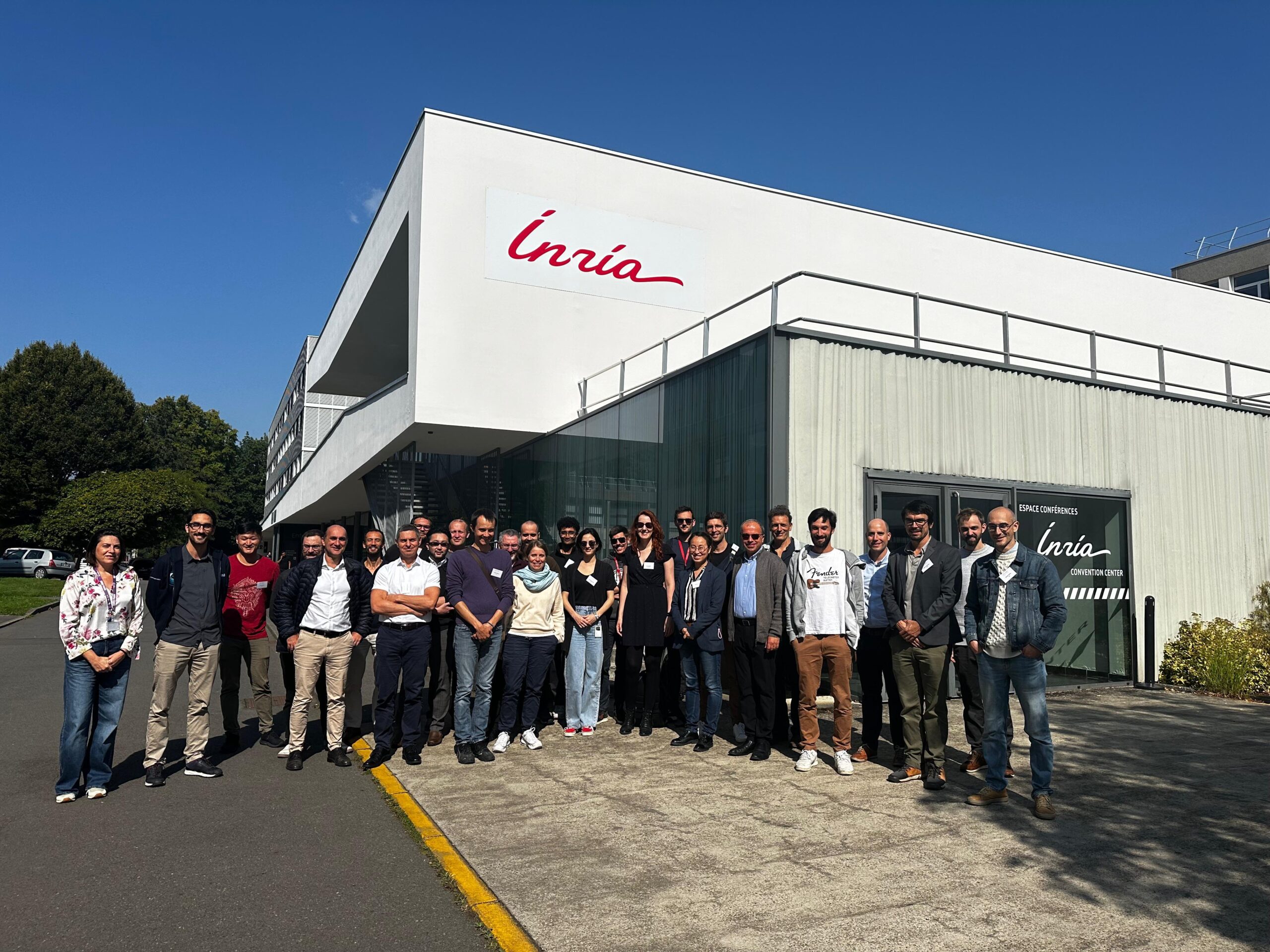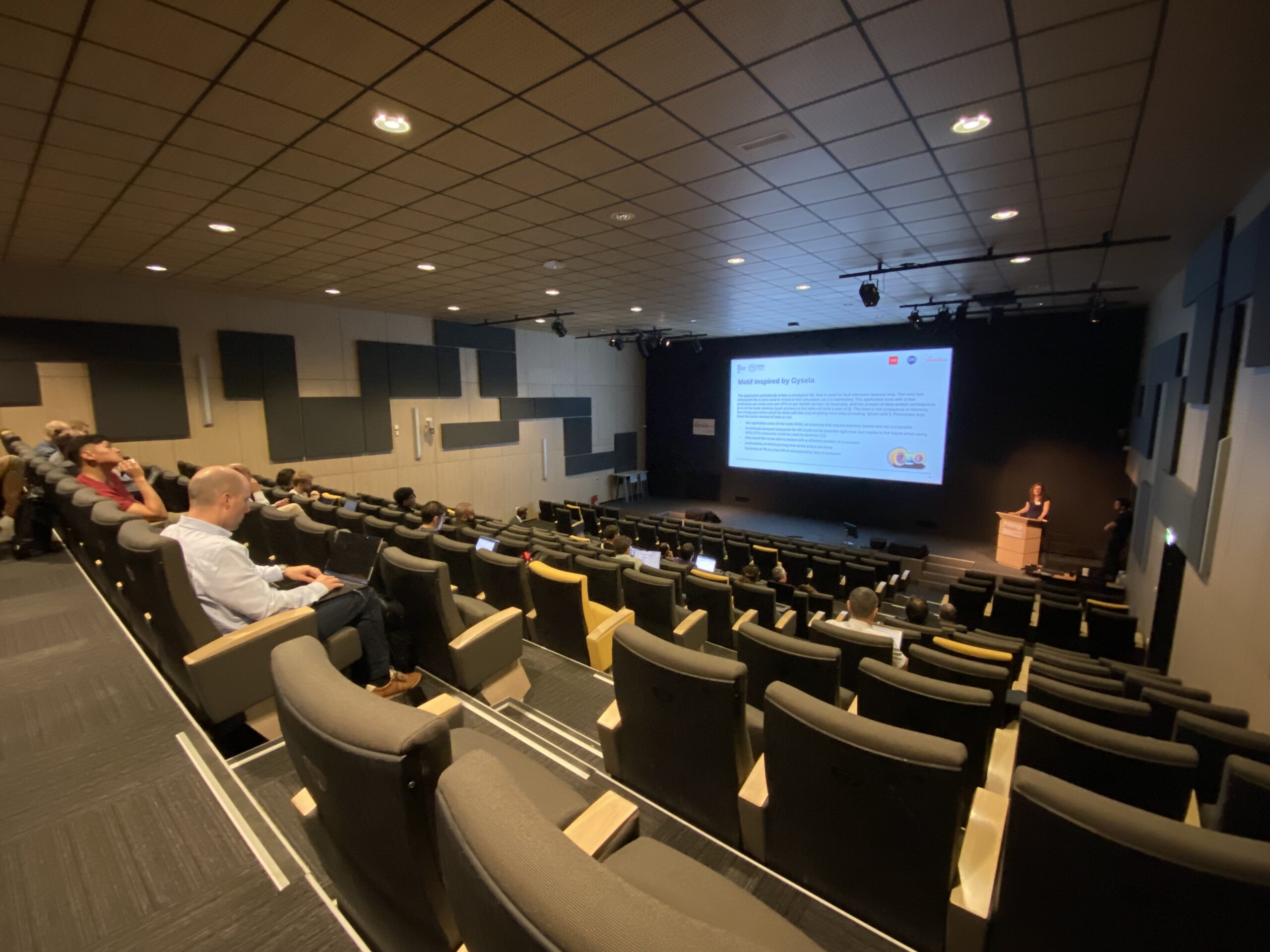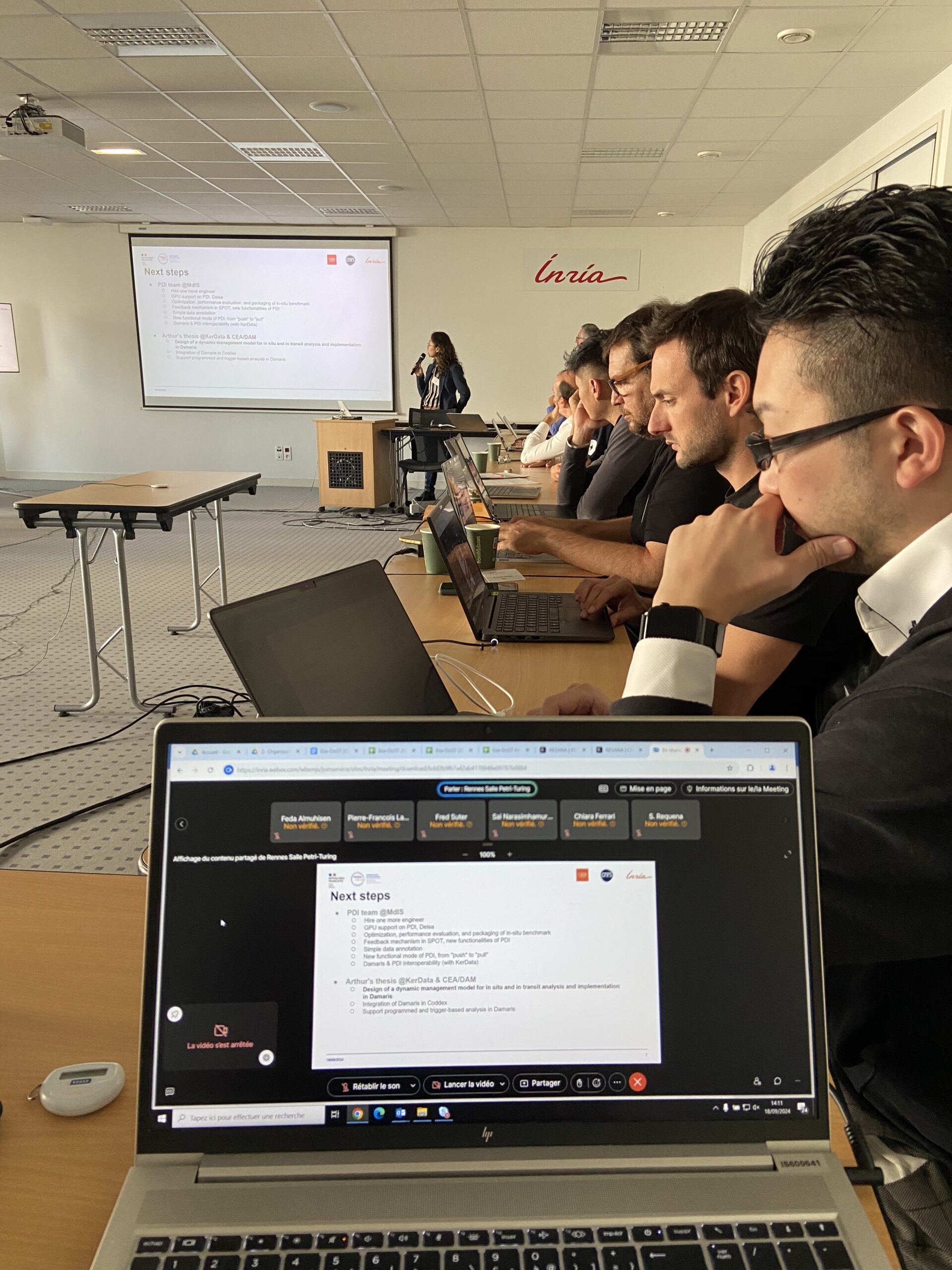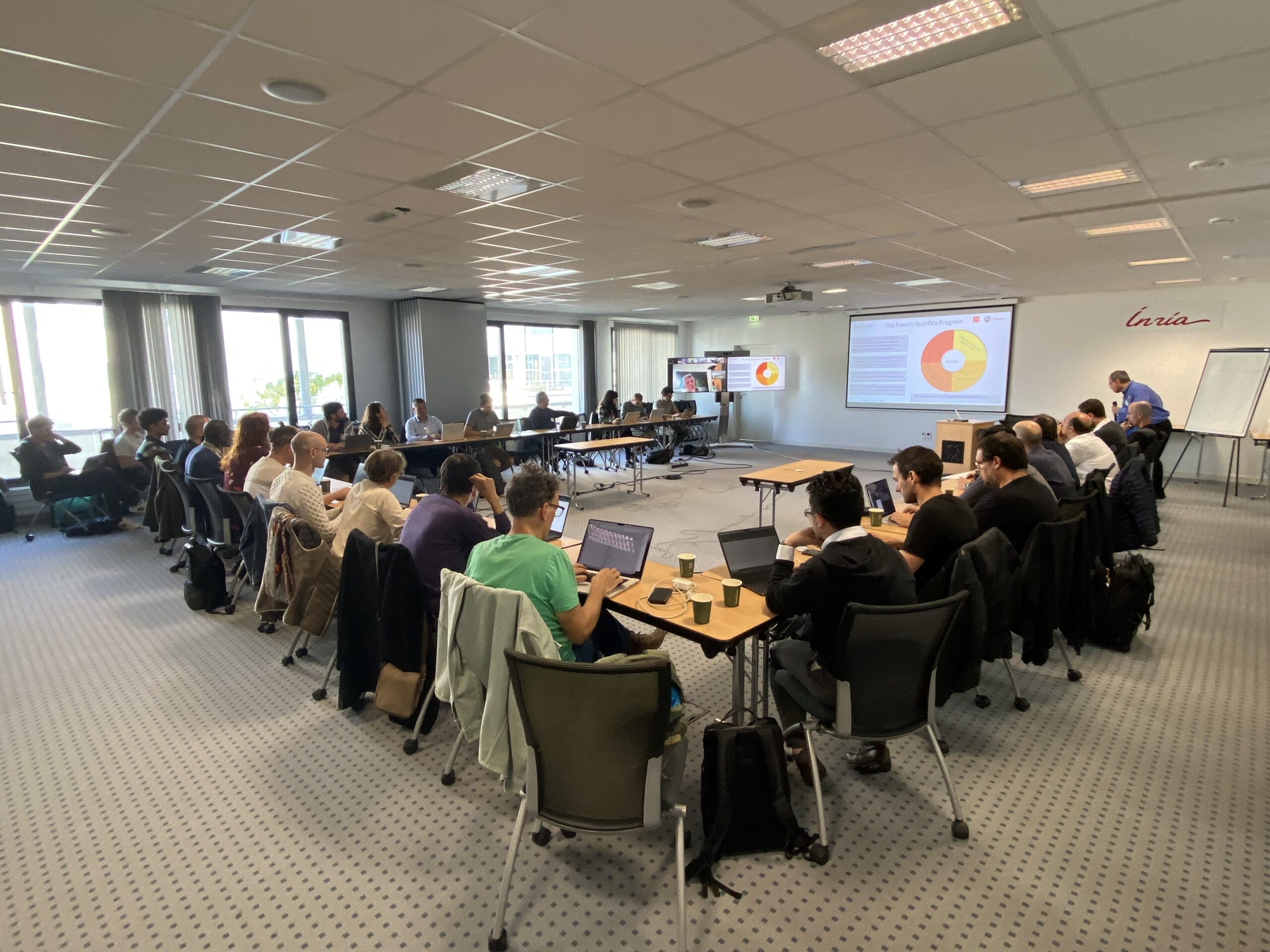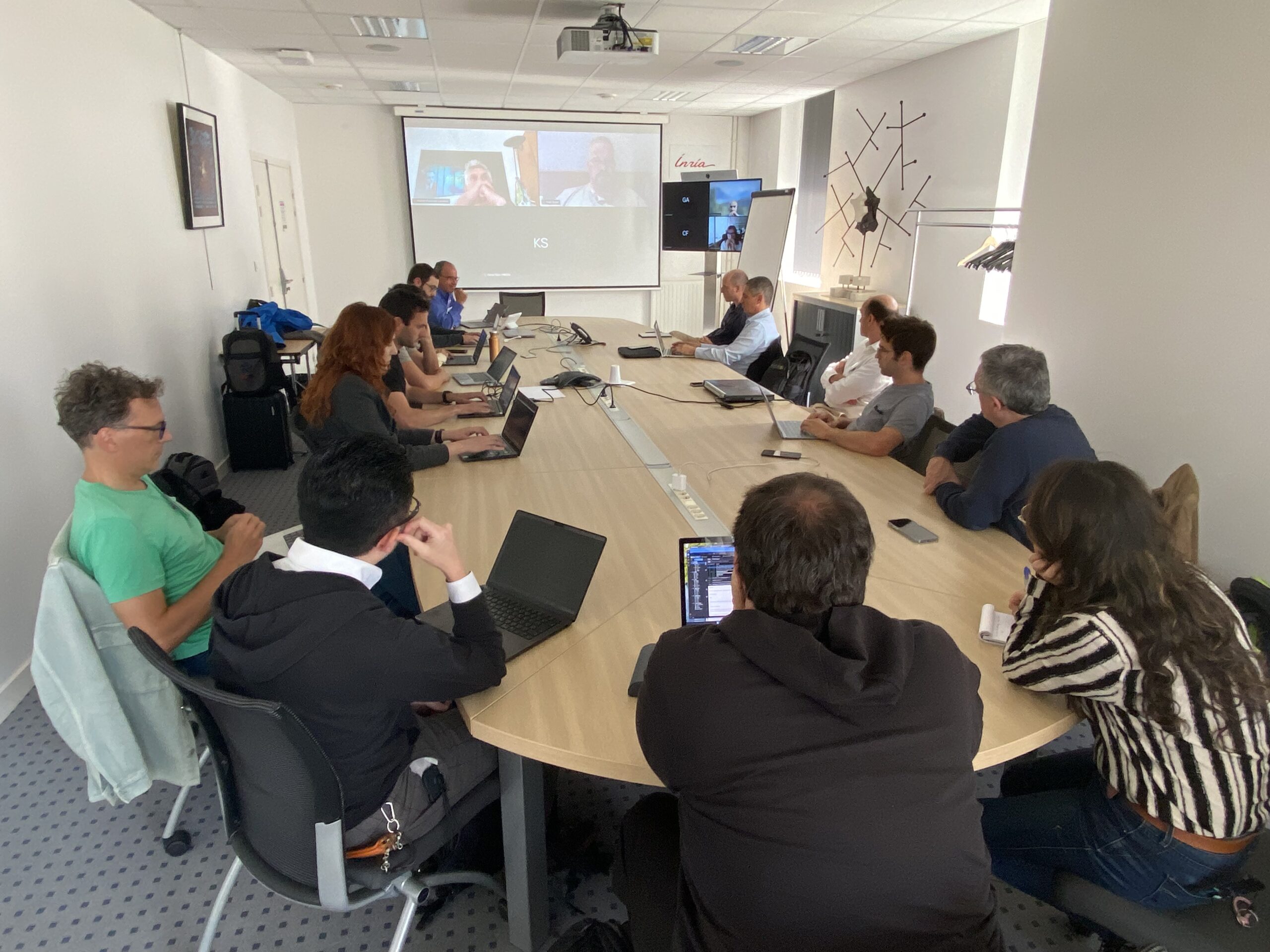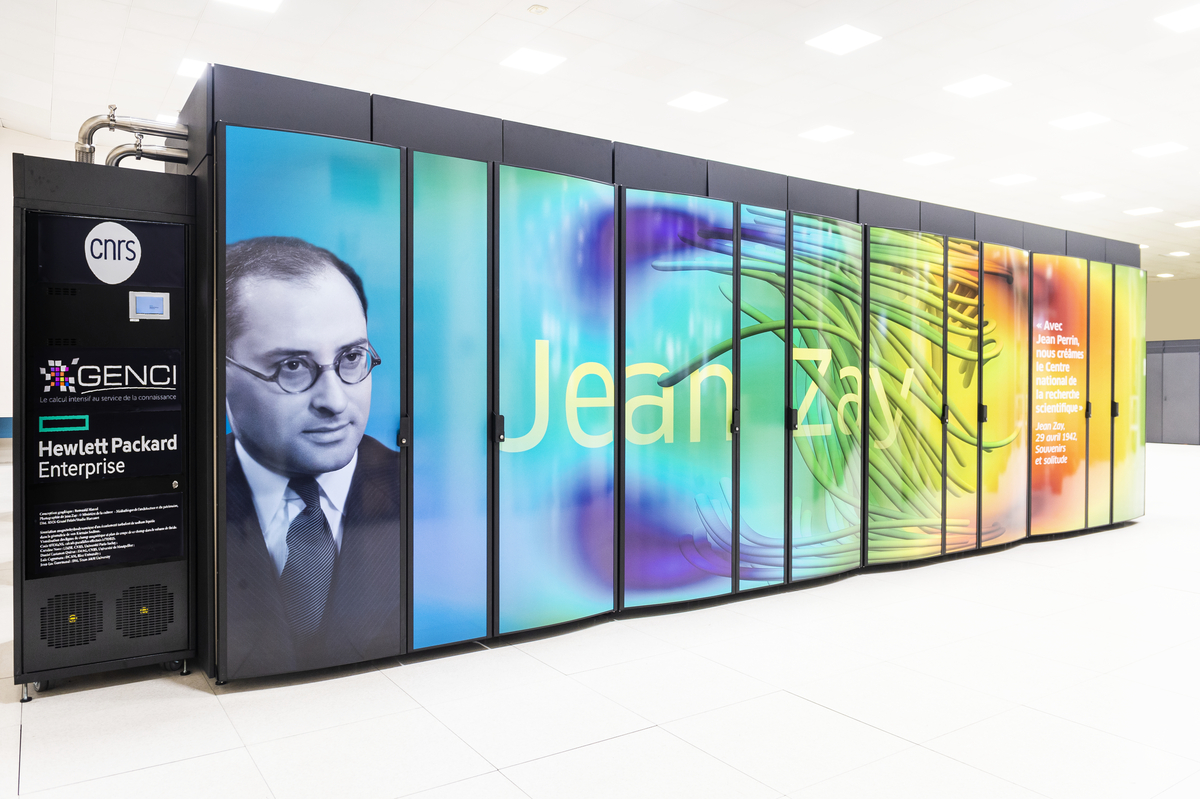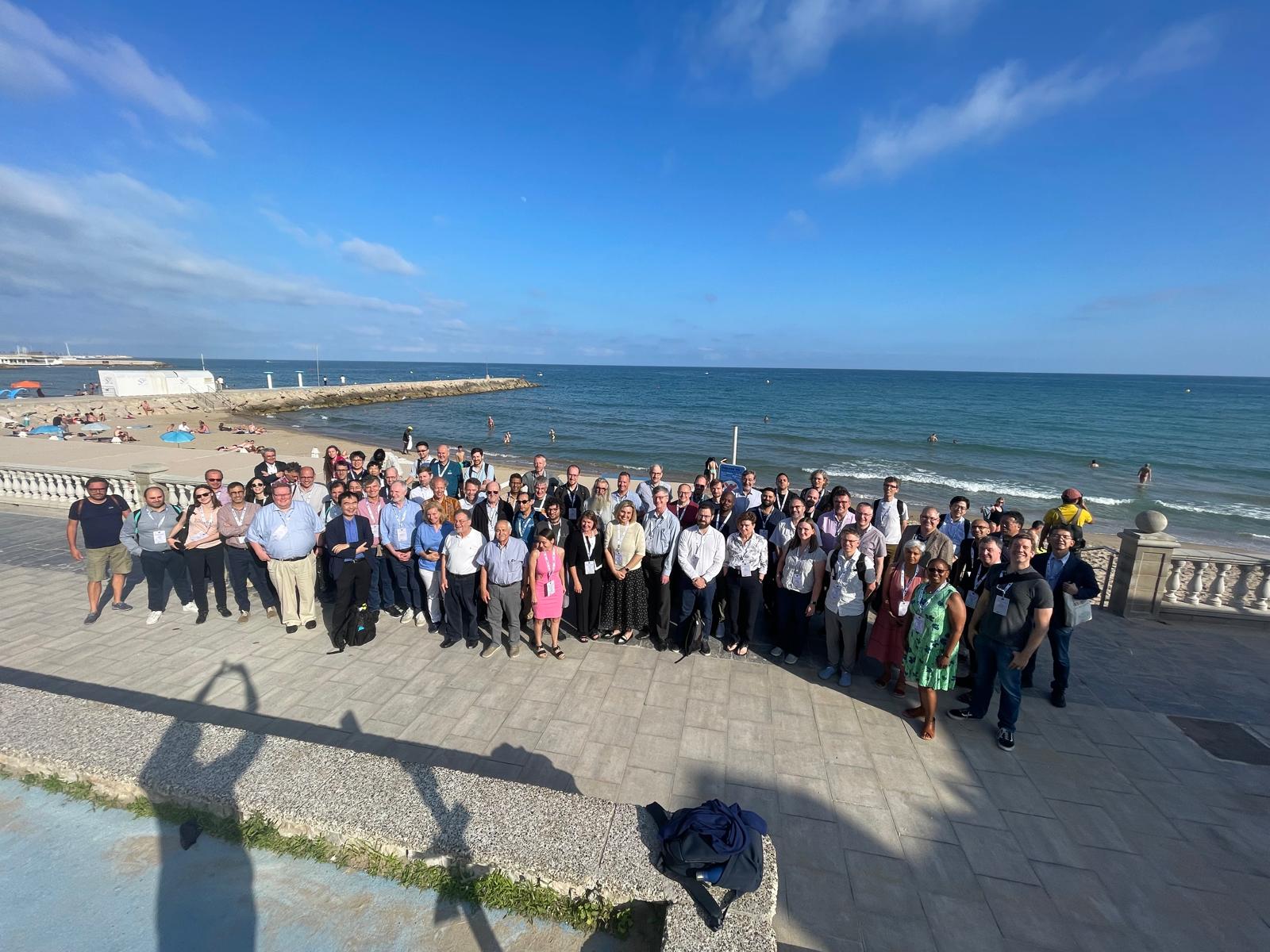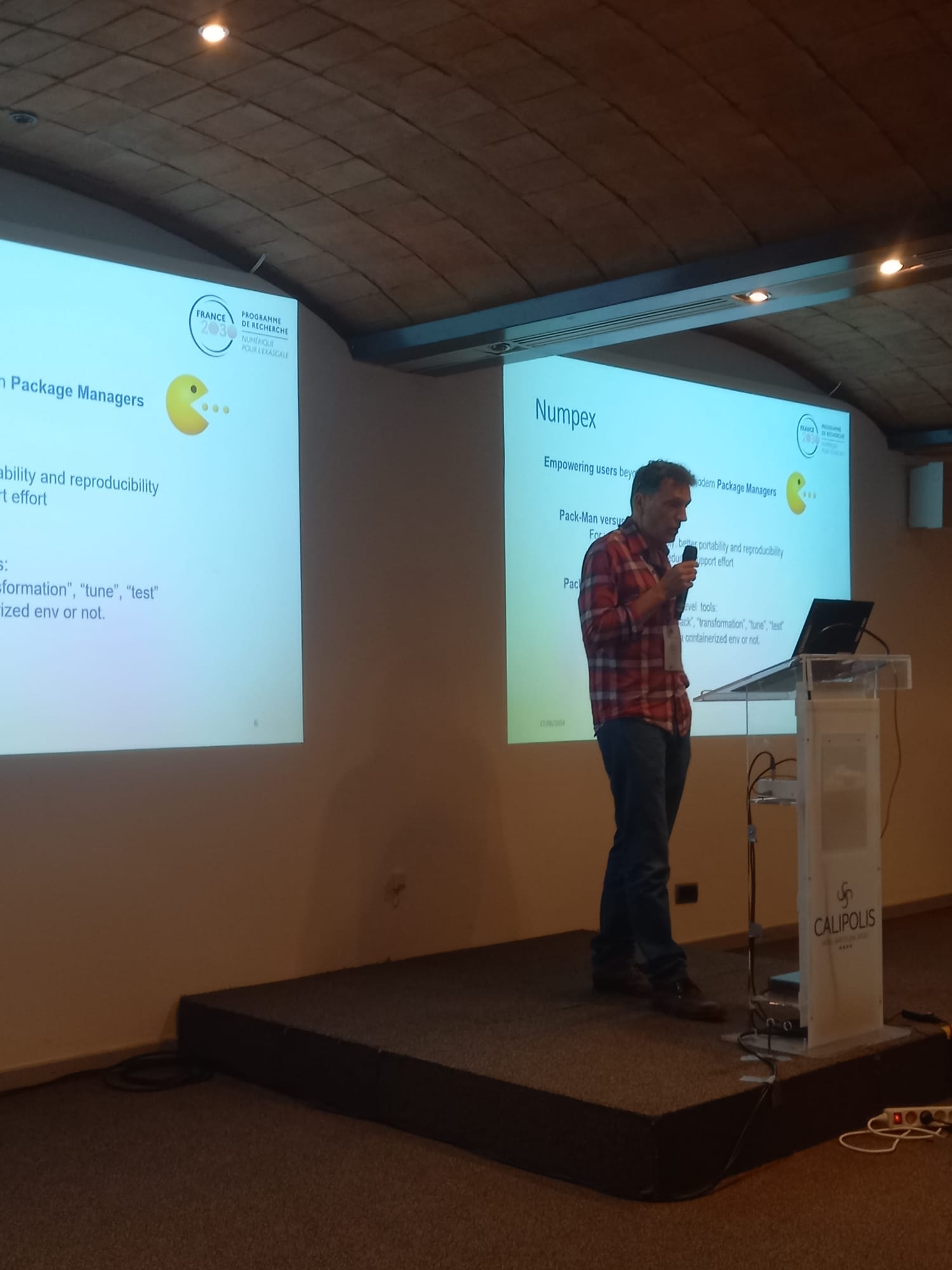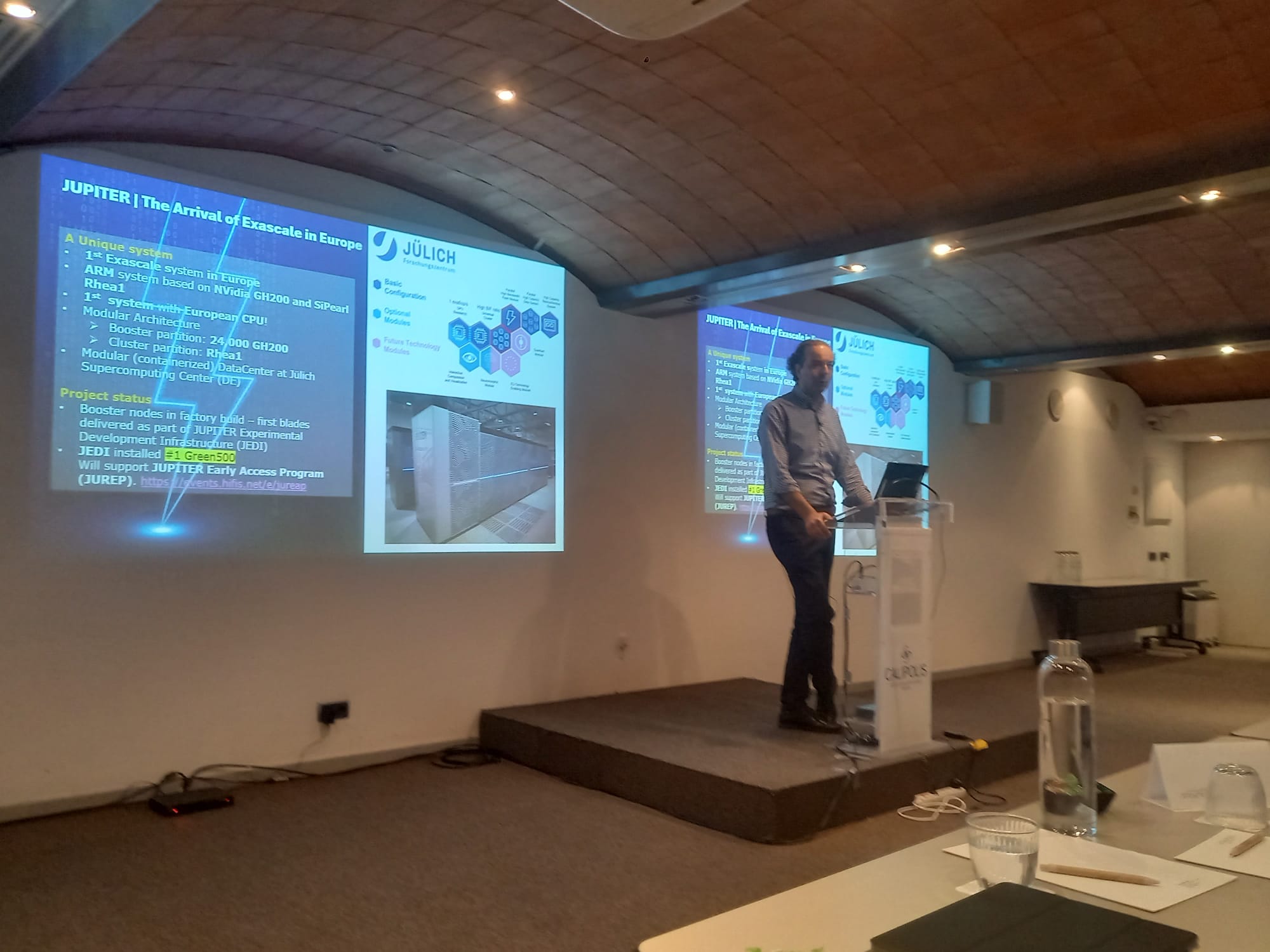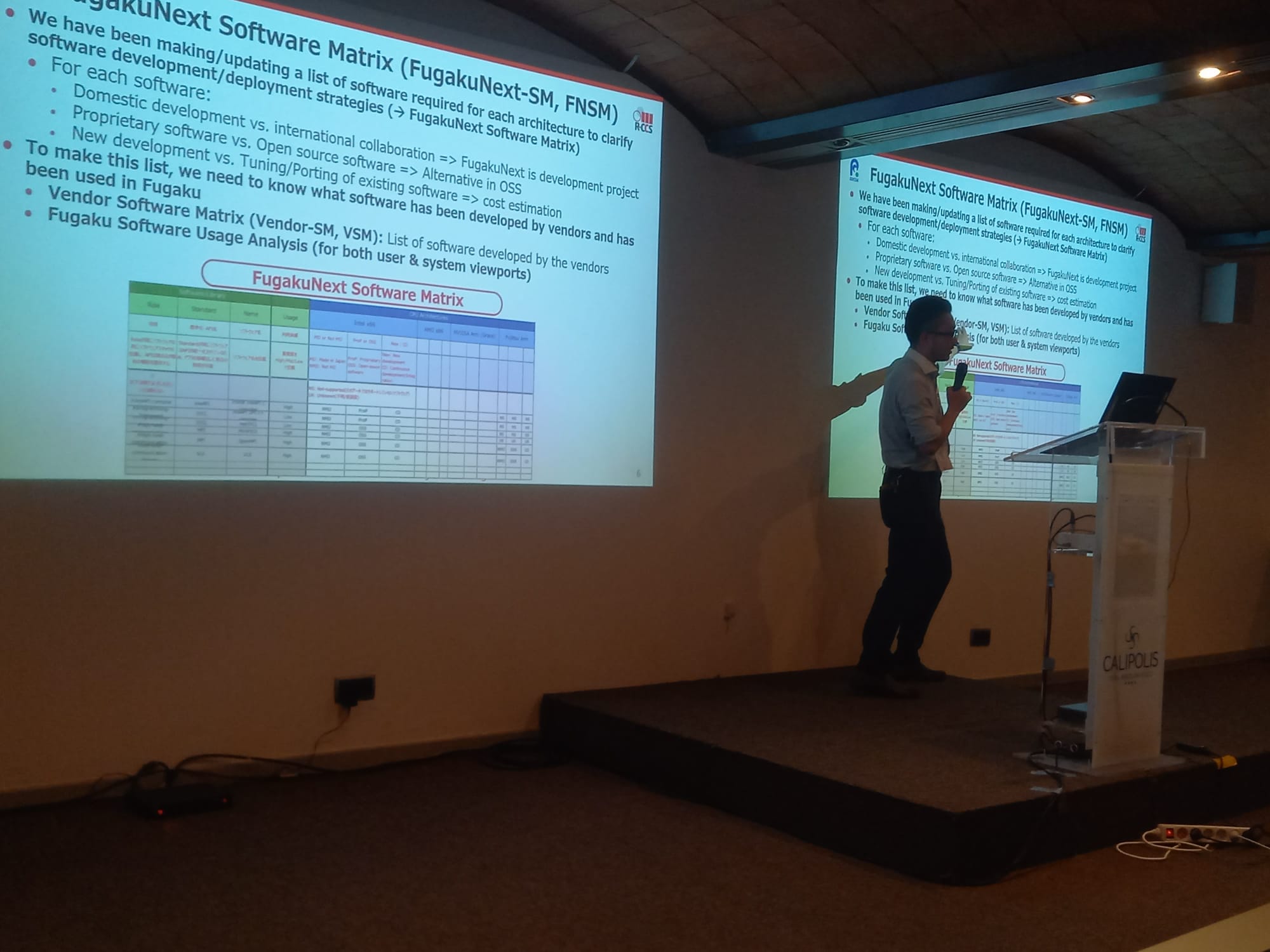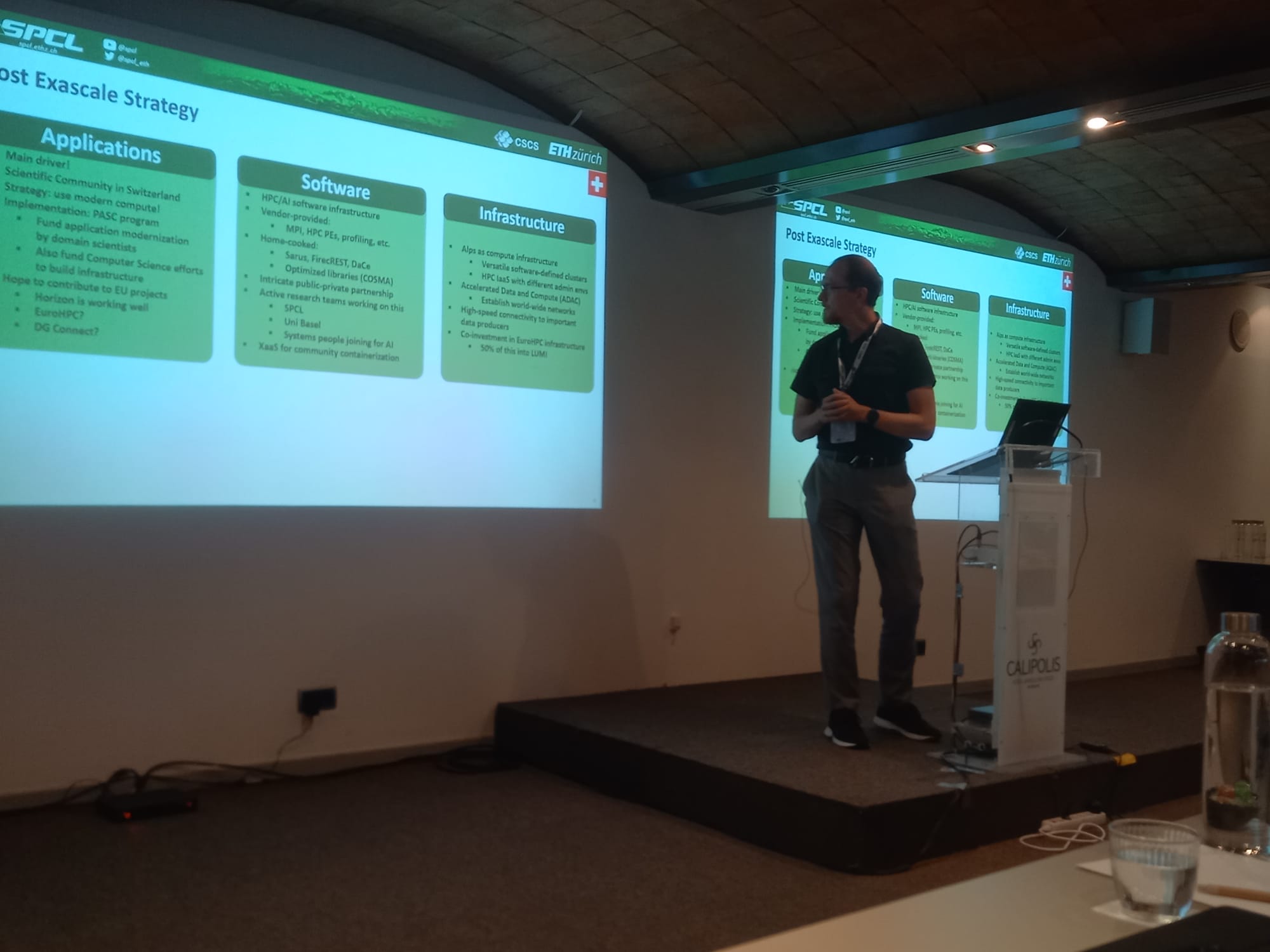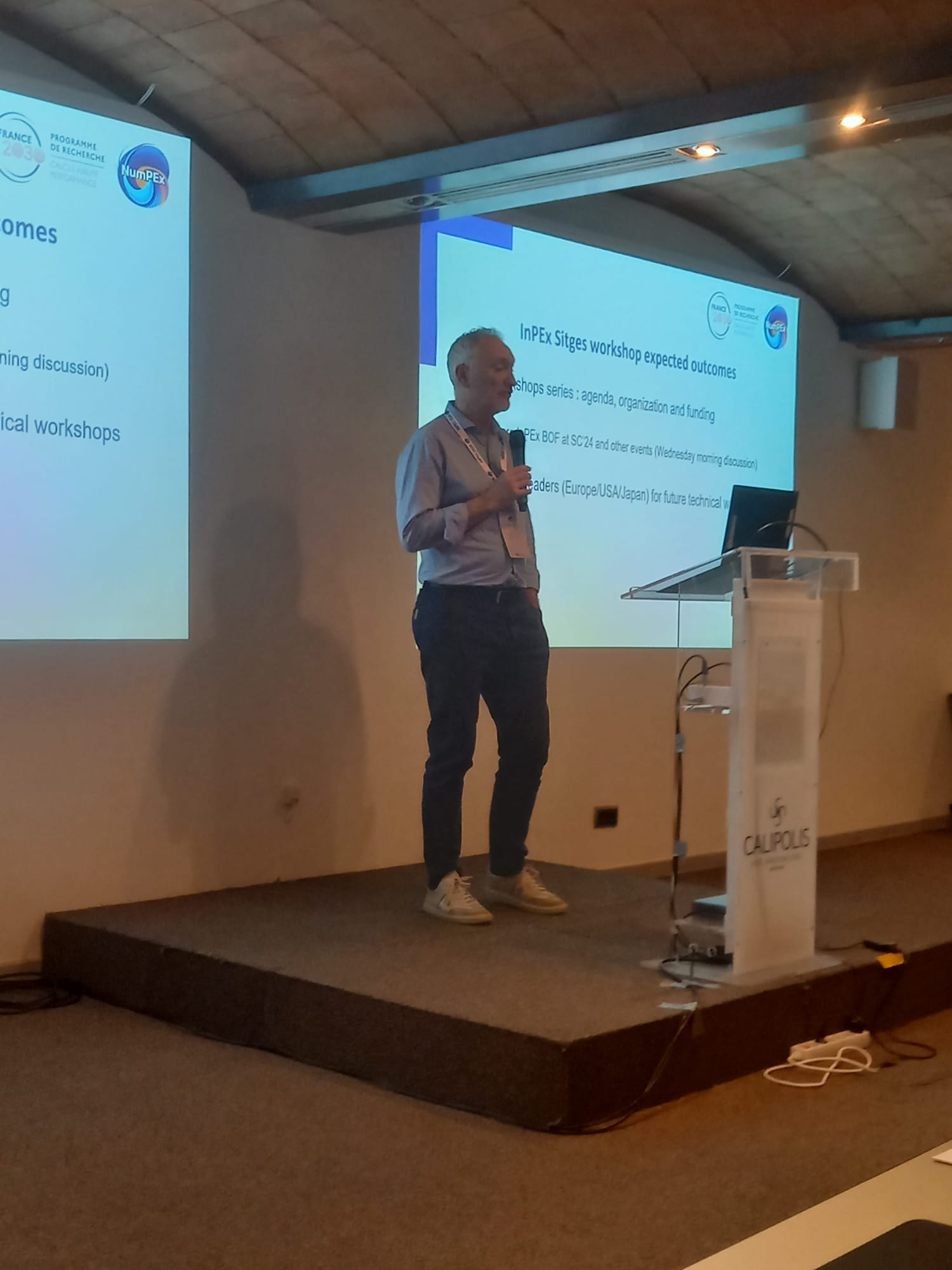Brice Goglin and Samuel Thibault: HPC mapping experts awarded by the french Académie des sciences
Article originally published on Inria website here
Every November, the french Académie des sciences unveils its prestigious awards. This year, alongside Brice Goglin, the NumPEx member Samuel Thibault have just been awarded the Inria – Académie des sciences – Dassault Systèmes Innovation Prize.
Samuel Thibault is responsible for the runtime part of the Exa-SofT software stack. More specifically, he is in charge of the integration of communications with task scheduling, high-level expression of the division of computational tasks, and fault tolerance. Samuel is also co-leader of the working group Accelerator.
Learn more about his research in the article published by Inria.
Photo credit académie des sciences – Mathieu Baumer
Call for proposals "Numérique pour l’Exascale"
The NumPEx program is launching its first call for projects to support advances in high-performance computing (HPC), high-performance data analysis (HPDA) and artificial intelligence (AI). Our France 2030 research program aims to develop software capable of operating future exascale machines, and to prepare the main scientific and industrial application codes.
This call is structured around three axes:
- Emerging AI methods, algorithms and software for scientific computing and HPC for AI.
- Programming models adapted to accelerated architectures.
- Workflows for scientific data analysis, with the SKA project as a use case.
This call for projects has a budget of 4 million euros. It will fund 1 to 2 projects per axis, for a maximum duration of 48 months.
The amount of funding requested must be a minimum of 500 k€ and a maximum of 1 M€, depending on the theme of the project.
The same project manager can only be responsible for one PEPR project, including targeted projects.
Deadline for applications: April 15th, 2025 (11h00 CET).
Josselin Garnier appointed to the French Académie des Sciences
Article originally published on the french Académie des sciences website here
Josselin Garnier, professor at École Polytechnique and member of Exa-MA, is one of 18 scientists appointed to the French Académie des sciences in recognition of his significant contributions to research.
Alongside Clément Gauchy, CEA research staff member, Josselin Garnier coordinates the workpackage “Uncertainty quantification” of the Exa-MA project. The objective of this workpackage is to leverage exascale computing to implement advanced analysis methods that require a large number of executions of complex simulation codes to quantify uncertainties in these simulations and solve inverse or optimization problems in the presence of uncertainties. The work carried out aims to quantify the confidence that can be placed in the predictions derived from these simulations and to facilitate decision-making based on them.
Learn more about his career and research in the article published by the French Académie des sciences.
Photo credit Adobe Stock
The 2024 annual meeting of Exa-DoST
The second annual meeting of the NumPEx Exa-DoST project took place at Inria, in Rennes, on 18-19 September 2024. This two days were an opportunity to share the first outcomes of the projet and discuss the upcoming research.
The Exa-DoST project is one of the five targeted projects of the NumPEx program, focusing on the challenges posed by data storage, processing, and analytics in the context of the emergence of Exascale Computing in Europe. The goal is to leverage innovative storage technologies and support complex hybrid workflows involving simulation, analytics, and learning, running at extreme scales across supercomputers interconnected to Clouds and Edge-based systems.
The second annual meeting of the Exa-DoST project took place at Inria, in Rennes, on 18-19 September 2024. It gathered participants in the project (scientists, engineers, students) with the goal of providing a common, shared vision on the project’s objectives, activities, and strategy. It also included specific workshops focused on identifying challenging application requirements in terms of data storage and analytics. For the first time, members of the ExaDoST Scientific Advisory Committee and of the Industrial and Technology Advisory Committee attended a global Exa-DoST meeting.
Wednesday, 18 September 2024
The first day was dedicated to presentations providing an overview of the project’s goals and activities in the various specific areas covered by the technical work packages. These were followed by a discussion on how the activities performed in these work packages (WP) could interact together.
-
- Introduction to NumPEx and Exa-DoST
by Gabriel Antoniu, Inria research scientist and Exa-DoST co-leader
and Julien Bigot, CEA research scientist and Exa-DoST co-leader - Goals and progress status of the work packages:
- WP1 – Storage and I/O
by Francieli Boito, Inria research scientist and Exa-DoST WP leader
and François Tessier, Inria research scientist and Exa-DoST WP leader - WP2 – In situ processing
By Yushan Wang, CEA research scientist and Exa-DoST WP leader
and Laurent Colombet, CEA research scientist and Exa-DoST WP leader - WP3 – ML-based analytics
by Thomas Moreau, Inria research scientist and Exa-DoST WP leader
and Bruno Raffin, Inria research scientist and Exa-DoST WP leader - WP4 – Application illustrator :
by Virginie Grandgirard, CEA research scientist and Exa-DoST WP leader
and Damien Gratadour, Université Paris Cité professor and Exa-DoST WP leader
- WP1 – Storage and I/O
- Introduction to NumPEx and Exa-DoST
- Session on inter-WP interaction
animated by Gabriel Antoniu and Julien Bigot
Thursday, 19 September 2024
-
- Introduction to the parallel brainstorming sessions
by Julien Bigot - Session on Codex
by Laurent Colombet - Session on Gysela
by Virginie Grandgirard - Session on SKA
by Laurent Colombet
- Introduction to the parallel brainstorming sessions
The participants found the exchanges particularly fruitful and decided to continue this work through a series of online and physical meetings.
Attendees
- Gabriel Antoniu, Inria and Exa-DoST leader
- Rosa Badia, BSC and board member of Exa-DoST
- Thomas Badts, Inria
- Andres Bermeo Marinelli, Inria and member of Exa-DoST
- Julien Bigot, CEA and Exa-DoST leader
- Francieli Boito, Inria and Exa-DoST WP leader
- Silvina Caino-Lores, Inria and member of Exa-DoST
- Damien Chapon, CEA and member of Exa-DoST
- Laurent Colombet, CEA and Exa-DoST WP leader
- Almuhisen Feda, CEA and member of Exa-DoST
- Chiara Ferrari, Observatoire de la Côte d’Azur and Board member of Exa-DoST
- Virginie Grandgirard, CEA and Exa-DoST WP leader
- Damien Gratadour, Université Paris Cité and Exa-DoST WP leader
- Gabriel Hautreux, CINES and board member of Exa-DoST
- Nicolas Lardjane, CEA and board member of Exa-DoST
- Pierre-François Lavallée, CNRS and board member of Exa-DoST
- Jakob Luettgau, Inria and member of Exa-DoST
- Benoit Martin, CEA and member of Exa-DoST
- François Mazen, Kitware and board member of Exa-DoST
- Yann Meurdesoif, CEA and board member of Exa-DoST
- Dorian Midou, CEA and member of Exa-DoST
- Shan Mignot, CNRS and member of Exa-DoST
- Julien Monniot, Inria and member of Exa-DoST
- Thomas Moreau, Inria and Exa-DoST WP leader
- Sai Narasimhamurthy, ParTec and board member of Exa-DoST
- Etienne Ndamlabin, Inria and member of Exa-DoST
- Jean-Francois Nezan, INSA
- Thomas Noël, ANR and Exa-DoST point of contact
- Kevin Obrejan, CEA and member of Exa-DoST
- Guillaume Pallez, Inria and member of Exa-DoST
- Lucas Pernollet, CEA and project manager of NumPEx
- Cédric Prigent, Inria and member of Exa-DoST
- Abhishek Purandare, Inria and member of Exa-DoST
- Bruno Raffin, Inria and Exa-DoST WP leader
- Stéphane Requena, Genci and board member of Exa-DoST
- Kento Sato, Riken and board member of Exa-DoST
- Frederic Suter, CNRS and board member of Exa-DoST
- François Tessier, Inria and Exa-DoST WP leader
- Sunrise Wang, Observatoire de la Côte d’Azur
- Yushan Wang, CEA and Exa-DoST WP leader
© Lucas Pernollet
NumPEx newsletter n°1 - First insights into the NumPEx program!
Redirection vers la newsletter... Si rien ne se passe, cliquez ici.
2023 Inria annual report: NumPEx, a programme aimed at boosting the capacities of exascale computing
The annual report of the French National Institute for Research in Digital Science and Technology (Inria), published last June, provides an overview of the research activities and results of its teams and laboratories. Appointed coordinator of the “Numérique logiciel” program agency in 2024, Inria is a key player in French computer science research. Inria works to ensure that France is part of the European dynamic through the research and innovation of its project teams and collaborations with other research organizations.
Inria’s highlights for 2023 include a panel of France 2030 research programs co-piloted by Inria, including NumPEx!
Find out more on page 10 of the 2023 annual report.
2023 – Annual Report Inria (english version)
2023 – Rapport d’activité Inria (french version)
© Guillaume Martel / CEA
NumPEx Highlighted in GENCI's 2023 Annual Report
In the field of research and innovation, GENCI is a key player in the landscape of high-performance computing (HPC) in France. Established in 2007, its mission is to provide the French scientific community with some of the most powerful HPC resources in the world, including the supercomputers Jean Zay, Joliot Curie, and Adastra. These resources enable scientists to perform complex numerical simulations and analyze massive volumes of data, which are crucial for advancements in various fields such as climatology, particle physics, biology, and much more.
Recently, GENCI published its 2023 activity report, and one of the highlights of the year was the launch of NumPEx!
Find NumPEx on page 20 of the 2023 activity report of GENCI.
2023 – Annual Report GENCI (english version)
2023 – Rapport d’activité GENCI (french version)
© Cyril FRESILLON / IDRIS / CNRS Images
2024 InPEx Workshop
Find all the presentation on InPEx website here
The Barcelona Supercomputing Center and NumPEx were thrilled to gather the InPEx community in Sitges, Spain. From June 17th to June 19th, the workshop brought together around 100 HPC experts from Europe, Japan, and the United States.
This event was the perfect opportunity to discuss about the state of the art, projects and program for Exascale and post-Exascale, to present the lastest achievements of the InPEx working groups since the 2023 Workshop, and to work together about the next steps of InPEx.
If you want to know more, all presentations are available on InPEx website.
Photo credit: Corentin Lefevre/Neovia Innovation/Inria
The first workshop of the NumPEx Accelerator working group
On June 12-13th 2024, the Accelerator working group held the workshop “Programmation GPU” to take a first review of the current situation.
This workshop was the perfect occasion to have a comprehensive overview of the various approaches currently available for an effective use of GPUs, including direct programming, libraries, frameworks, and task-based methods.
The workshop enabled participants to leave with a clear understanding of the advantages and disadvantages of each approach and to benefit from insights and experiences with different codes across these approaches.
You will find below all the presentation materials and video recordings of the day’s events, which were held in French.
Introduction and Context
Both presented by Samuel Thibault, professor at Université de Bordeaux
Overview of GPU approaches
- Approche framework: Arcane, API accélérateur
Gilles Grospellier, CEA researcher - Approche bibliothèque: GPU Programming through external scientific libraries
Florent Pruvost, Inria researcher - Approche langage: Kokkos / OpenMP
Julien Bigot, CEA researcher - Approche tâches, StarPU
Samuel Thibault, professor at Université de Bordeaux
Retex session: feedback and experiences
- Retex – Approche tâches pour l’algèbre linéaire GPU + distribué
Antoine Jego, professor at Sorbonne Université - Retex – Approche tâches pour l’algèbre linéaire GPU + I/O, out-of-core, composition (Chameleon)
Florent Pruvost, Inria researcher - Retex – Approche OpenACC: YALES2
Vincent Moureau, CNRS researcher - Retex – Approche OpenACC: Porting a legacy Fortran CFD HPC code to (AVBP)
Joeffrey Legaux, engineer at CERFACS - Retex – Approche Kokkos: Dyablo, A new hardware-agnostic AMR code for Exascale using Kokkos
Arnaud Durocher, CEA researcher and engineer - Retex – Rust et OpenCL pour le portage GPU (minicl)
Philippe Helluy, professor at Université de Strasbourg
Contributions to the NumPex program and call for proposals
- Contributions prévues au sein du PEPR NumPEx
Samuel Thibault, professor at Université de Bordeaux - Brainstorming on the GPU call for proposals
Title image: © George Kedenburg / Unsplash
Théo Mary Awarded CNRS Bronze Medal for Rethinking Precision in Supercomputing
Read the orginal version here (French)
Computations and algorithms running on supercomputers must be optimized to achieve the best possible performance. Théo Mary, a CNRS research scientist at the LIP6 laboratory (CNRS/Sorbonne University), develops approximations that make it possible to solve problems involving up to hundreds of millions of unknowns in a reasonable time and with controlled loss of precision.
Exact sciences sometimes have much to gain from well-chosen approximations. Théo Mary, a research scientist at the LIP6 Laboratory, enhances algorithmic performance through such methods. His contributions span fields like approximate computing, scientific computing, and high-performance computing (HPC), which powers supercomputers.
“With increasingly powerful machines, scaling up computations presents a major challenge,” explains Théo Mary. “The methodology of approximate computing uses approximations and relaxes certain constraints on precision or robustness, in order to save time, storage, and energy.”
Indeed, the HPC community is preparing for the arrival of exascale machines—supercomputers capable of exceeding one exaflop, or a billion billion floating-point operations per second. Current algorithms must be optimized to run efficiently on such systems. France’s first exascale supercomputer is expected to go online in 2025.
Théo Mary focuses on two main types of approximations: computational and mathematical, which he develops and combines. Computational approximations involve switching from standard 64-bit number formats to more compact formats such as 32-bit or 16-bit. Mathematical approximations compress data at the algorithmic level, often by leveraging structured matrices—such as sparse or low-rank matrices. The acceptable level of precision loss is defined by users’ concrete needs.
Théo Mary has made several contributions—both theoretical and practical—to the field of approximate algorithms. On one hand, he studies their stability, ensuring they yield consistent results even when values are rounded or approximated. On the other hand, he implements these algorithms on parallel supercomputers and optimizes their performance. His work has been applied to geophysics projects, including seismic imaging analysis, as well as in fluid mechanics.
“I think, for instance, about how many significant digits we really need to retain in a calculation, knowing that traditional computations preserve sixteen digits after the decimal point,” explains Théo Mary. “For geophysical models, four digits are often enough. These compressions can lead to performance improvements by several orders of magnitude. If you can successfully approximate a quadratic-complexity function with a linear one, the speedup can be up to a thousandfold. In geophysics, within the WIND project, this allowed us to solve a problem involving 500 million unknowns—likely a world record—which required the use of 50,000 processor cores.”
“I bring to these projects the benefits of approximate computing.”
This major achievement was made using the open-source software MUMPS (Multifrontal Massively Parallel Sparse Direct Solver), in which Théo Mary is deeply involved. MUMPS is a function library that has solved sparse linear algebra problems for over 30 years. Théo has been contributing to it for about a decade, notably by introducing both numerical and computational compressions. He has also recently joined the NumPEx Exascale Computing Research Program (PEPR NumPEx). This large-scale initiative aims to optimize HPC, artificial intelligence, and high-performance data analytics (HPDA) to fully harness the potential of the exascale era.
These contributions have earned Théo Mary the CNRS Bronze Medal. “I’m deeply honored by this recognition,” he says. “I’m glad for the opportunity to highlight the topics I work on, and I firmly believe that approximate computing will offer promising solutions in the exascale era.”
Read the original version on CNRS Informatics
© Théo Mary

